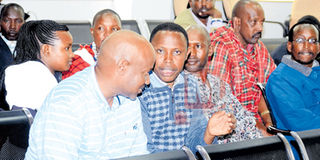Loliondo herders case halted over translation snag

What you need to know:
- Principal state attorney Mark Mulwambo argued that the case cannot proceed because credentials of those who translated the affidavit for the applicants are not known.
Arusha. Hearing of a case in which Loliondo herders have sued the government over forced eviction came to a halt on Wednesday over a translation snag.
Principal state attorney Mark Mulwambo argued that the case cannot proceed because credentials of those who translated the affidavit for the applicants are not known.
“Credentials of those who made the translation are important because allegations against the government cannot be take lightly,” he told the East African Court of Justice (EACJ).
There was a legal wrangle at the Court over the credibility of the document presented by livestock keepers from Ololosokwan and three other villages from Loliondo area in Ngongorongoro district.
The application is seeking court to issue an interim order restraining and prohibiting the government from evicting the villagers from the disputed land. The same suit contests confiscation of livestock from grazing on the disputed area until the main case filed before the court by the herders is determined. The applicants are the village councils of Ololosokwan, Oloirien, Kirtalo and Arash in Ngorongoro district, Arusha region. They alleged plans to evict the villagers from the area not only contravened the constitution of the United Republic of Tanzania, but also the Village Land Act, 1999. Forced eviction also breached the Wildlife Conservation Act, 2009 as well as the Treaty for the Establishment of the East African Community (EAC).
However, the principal state attorney objected to the continuation of hearing, saying the respondent was not sure of the credentials of those who did the translation of the document submitted to the court.
“The language of the court (EACJ) is English. There are rules on who should do the translation. We want a person to possess certain credentials,” he said.
Donald Deya, an Arusha-based advocate representing the applicants, objected to the arguments, saying there was no rule which requires the CVs of those who did the translation to be attached to the claims.
He said although the language of the Court is English, Kiswahili is the language of the general public in Tanzania and that there should not be any doubt on authenticity of the translated copies.
“What was translated was the true,original copy in Kiswahili”, he said before Lady Justice Monica Mugenyi adjourned hearing to next month.




